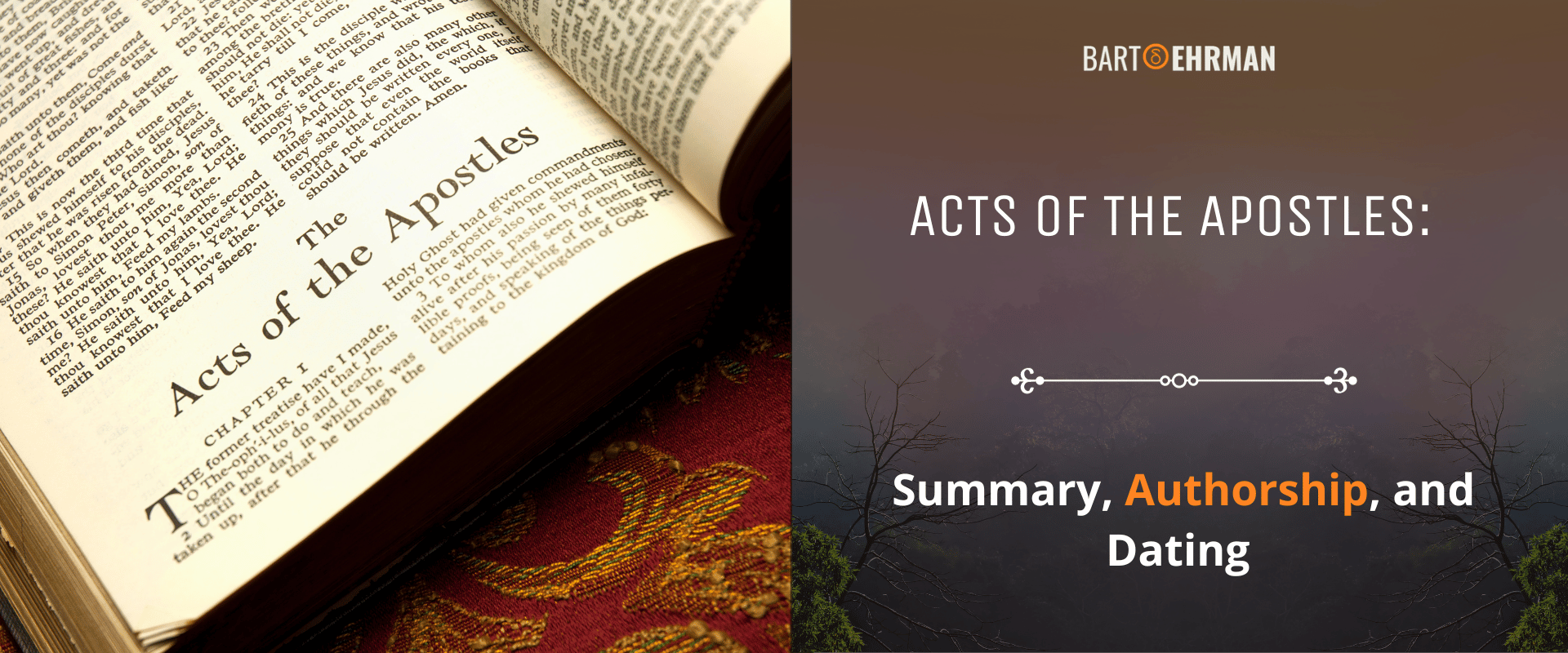Acts of the Apostles: Summary, Authorship, and Dating

Written by Marko Marina, Ph.D.
Author | Historian
Author | Historian | BE Contributor
Verified! See our guidelines
Verified! See our editorial guidelines
Date written: November 28th, 2023
Edited by Laura Robinson, Ph.D.
Disclaimer: The views and opinions expressed in this article belong to the author and do not necessarily match my own. - Dr. Bart D. Ehrman
Acts of the Apostle is a meticulously crafted narrative, cloaked in both the mystique of ancient times and the intrigue of modern scholarship. It serves as a remarkable portal into the origins of the Christian religion.
As we venture into the heart of this historical tome, we embark on a journey to uncover the secrets of its creation, the identity of its author, the intricacies of its dating, and the enigmatic location where its words were first inscribed.
The origins of Christianity hide many secrets and captivating facts! If you want to know more about it, join “The Unknown Gospels” - a fascinating course by a renowned historian Bart Ehrman. In eight 30-minute lectures, Dr. Ehrman will guide you through the beginnings of Christianity and the life of the historical Jesus!

Book of Acts Summary: What is Acts About in the New Testament?
Let’s first take a look at what the Book of Acts is all about. To understand it, we must begin with the title itself.
The book is called the Acts of the Apostles (Πράξεις Ἀποστόλων) because it primarily focuses on the actions and deeds of the early apostles, particularly the apostles Peter and Paul, and their instrumental roles in the growth and spread of the early Christian Church.
Furthermore, the term Πράξεις indicates a specific Greek literary genre: the exposition of the heroic deeds of famous historical or mythological figures in the form of a story. In this case, the main characters of the story are Peter and Paul with the emphasis on the latter.
The Acts of the Apostles highlights in 28 chapters key events such as the Day of Pentecost, the conversion of Saul (who later became the apostle Paul), and Paul's missionary journeys to various cities in the Roman Empire, including Jerusalem, Antioch, Ephesus, Athens, and Rome. It also describes their challenges and opposition in spreading the Christian message.
As with other New Testament documents, the Acts of the Apostles convey a particular message. It’s all built on the theologically motivated idea of the harmonious growth of the first Christian communities whose stability and prosperity were guarded by the authority of early apostles such as Peter, John, and Paul.
Moreover, the author of the Acts of the Apostles (and we’ll soon see who he was!) emphasizes how the message of Jesus’ death and resurrection was spread from the original Jewish community to the whole Gentile world. This is, as Raymond Brown notes in his Introduction to the New Testament, the central theme of the entire book.
In this respect, the author continues a theme that he already developed in the Gospel of Luke. Namely, the Gospel of Luke presents the shift of Jesus’ message from his Jewish audience to Gentiles. For Luke, the Acts church is a very Gentile one! They are the ones who understand him. The same motive is found in the Acts of the Apostles as well.
In the New Testament, Dr. Ehrman notes that this theme is vividly exposed after Peter’s vision (Acts 10:9-48) in which God explains that his plan of spreading Christianity includes the Gentiles. They are meant to hear and accept the good news of salvation.
The vision Peter had prompted a series of events that culminated with the conversion of a multitude of Gentiles: “The circumcised believers (i.e. Jewish Christians) who had come with Peter were astonished that the gift of the Holy Spirit had been poured out even on Gentiles (Acts 10:45).”
Furthermore, the author of Acts emphasizes that everything evolves just as God had planned. The whole of salvation history in the Book of Acts is, as Hans Conzelmann notes, divided up into three epochs:
Why was this theme so important to the author? Delbert Burkett explains: “In emphasizing this theme, the author of Luke-Acts was seeking to justify a situation that existed in his day: the church consisted primarily of Gentiles rather than Jews.
Did You Know?
Within both Orthodox and Catholic traditions, Luke is venerated as a patron saint of physicians. There are eight bodies and nine heads, located in different places, and presented as his relics. The most famous are the ones held at the Abbey of Saint Giustina in Padua (Italy). Having multiple relics of the same person in different places isn’t that unusual within the Christian tradition. At least three different churches in the Middle Ages were claiming to possess the head of John the Baptist!
In other words, the Acts of the Apostles are structured around the picture of history in which Gentiles, unlike Jews, accept Jesus’ message from the earliest days of the Christian movement. By doing that, the author of the Book of Acts creates a suitable explanation for the Church of his day which consisted mostly of Gentiles.
The Authorship of the Book of Acts
Who wrote the Book of Acts? Essentially, there are two confronting theories:
In that case, the author of the Book of Acts was a personal friend of the main character in the narrative. Jerome, known by his Latin translation of the Bible (Vulgate), claimed that Luke was “companion of all Paul’s journeying (omnis eius perigrinationis).”
They assert that the Book of Acts was written by an anonymous Christian living outside of Palestine who had no personal connection to the apostle Paul. The reasons for thinking this are numerous, and some of them we covered in another article that you can check here!
FREE COURSE!
WHY I AM NOT A CHRISTIAN
Raw, honest, and enlightening. Bart's story of why he deconverted from the Christian faith.
Over 6,000 enrolled!
Date of Acts’ Composition
When was the Book of Acts written? Dating the Acts of the Apostles has to start with the Gospel of Luke which the author calls “the first book” ( πρῶτον λόγον). The obvious meaning of this expression is that the Acts of the Apostles represent the sequel to that Gospel.
As in many other cases, scholars debate about the dating of Acts. Their perspective can be broadly categorized into three main groups:
Some conservative scholars such as Frederick F. Bruce believe that the Book of Acts was written in the mid-60s of the 1st century. One of the reasons for that assessment is the omission of any mention of Paul’s death. Similarly, the author doesn’t seem to know about Nero’s persecution in the 64 C.E.
However, the absence of certain historical events is not enough to build the case of early dating. Even the ending of the Gospel of Mark is abrupt and sudden. But no one, to my knowledge, argues that the author made such an abrupt ending because he didn’t know about anything else that happened after Jesus’ death.
Other (more skeptical) scholars date Acts to the beginning of the 2nd century (100.-120. C.E.). It’s a position that seems more popular in recent years even though it goes back to earlier biblical scholars such as John C. O’Neil.
The theory on late dating is built upon an alleged literary dependence of Acts on Flavius Josephus (c. 100. C.E.) or even, in the case of O’Neill, Justin Martyr (c. 130. C.E.). However, these dependencies are far from clear. I haven’t been convinced, but the theory has gained some strength recently - especially after Richard Pervo’s study.
Most critical scholars believe that the Acts of the Apostles were written between 80. and 100. C.E. The reasons are primarily derived from the Gospel of Luke.
First and foremost, the Gospel of Luke reflects the historical context of the third generation of Christians, which is also visible in the Book of Acts (20:18-35). Furthermore, the explicit admission by Luke that “many” have written the story about Jesus’ life (Lk 1:1) works against the early dating of the Acts of the Apostles.
Moreover, Jesus’ judgment on the Temple (Mk 13:2) and his announcement of its desecration (Mk 13:14) are taken by the author of the Gospel of Luke. However, he readjusted Jesus’ prophecy by writing about “Jerusalem surrounded by armies” (Lk 21:20).
This editorial change on Luke’s part mirrors a description of the siege and capture of Jerusalem in 70. C.E. which means that the third Gospel was written after 70 C.E. Since Luke used Mark as a source (Synoptic problem), the Gospel of Luke was probably written between 80 and 90. C.E.
The Book of Acts, a second part of the work dedicated also to the Theophilus (Acts 1:1) was most likely written shortly after the Gospel. Joseph Fitzmyer, therefore, notes that most scholars place the composition of Luke-Acts in the years 80-90. C.E. and concludes that there aren’t any valid reasons to oppose this dating. Similarly, Hans Conzelmann observes that the period between 80. and 100. C.E. “best fits all of the evidence."

The Place of Composition: Where Was Acts of the Apostles Written?
The anonymous author of Acts was a highly educated upper-crust member of society and a great traveler familiar with the topography of the Roman Empire. Moreover, he displays the knowledge of Greek philosophical schools (e.g. Platonism), ancient historiography, and Jewish religious tradition.
His familiarity with the Greek translation of the Old Testament (Septuagint) suggests that he could come from the circle of the so-called “God-fearers” - pagans who found Judaism interesting and attractive but didn’t go all the way and converted.
To whom the Book of Acts was written? Delbert Burkett notes that “the emphasis on Paul in Acts suggests that the two-volume work may have been written for Gentile churches established by Paul. Which churches could that be? What is the exact place where Acts of the Apostles were composed?
Unfortunately, there are no clear answers. French New Testament scholar Daniel Marguerat explains in his Commentary that “the author of Luke-Acts can be located in the eastern part of the Mediterranean - without being able to specify the place better.”
Summing Up the Acts of the Apostles
In conclusion, delving into the depths of the Acts of the Apostles opens a door to a world where the threads of ancient history and contemporary scholarly exploration intertwine. What is the Book of Acts about? It is a meticulously crafted narrative that serves as a profound portal into the origins of the Christian religion.
From the heroic deeds of Peter and Paul to the pivotal events like the Day of Pentecost and the conversion of Saul, the Acts of the Apostles weaves a story of challenges, triumphs, and the relentless spread of the Christian message.
FREE COURSE!
WHY I AM NOT A CHRISTIAN
Raw, honest, and enlightening. Bart's story of why he deconverted from the Christian faith.
Over 6,000 enrolled!
